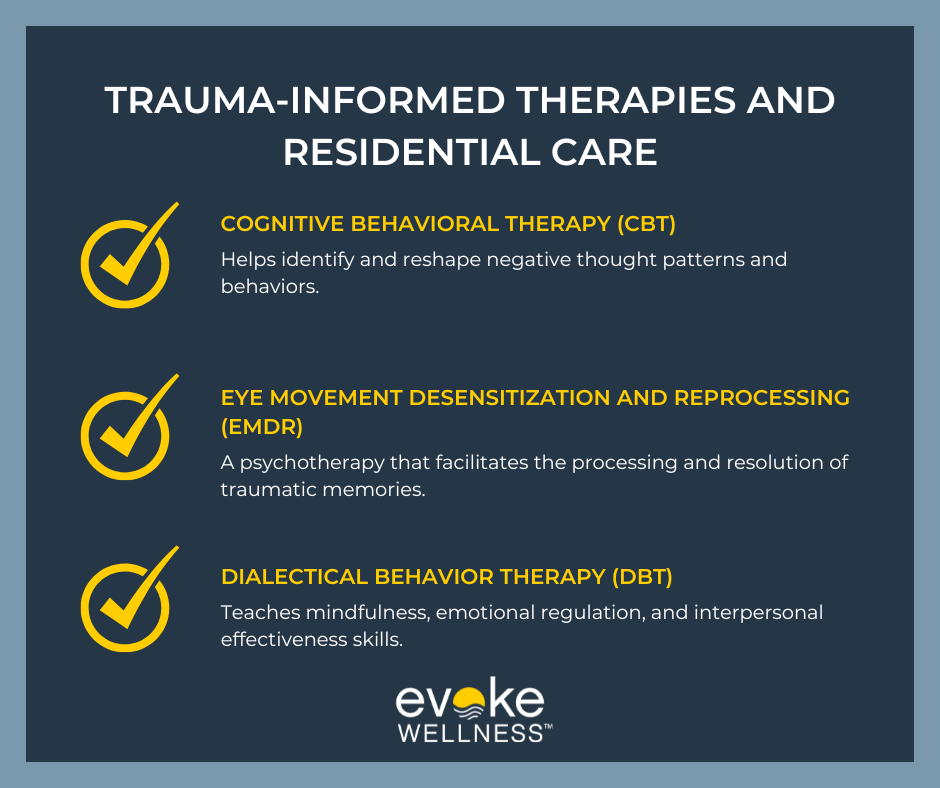Have you ever considered how past trauma might be influencing your substance use? Recent studies reveal a stark reality: up to 75% of individuals seeking addiction treatment report histories of trauma. This profound link between traumatic experiences and substance abuse underscores the critical need for comprehensive care. At Evoke Wellness at Miramar, we recognize that addressing trauma is often a crucial step in the recovery process. Our integrated approach combines medical detox, residential treatment, and dual diagnosis care to help you heal both the visible and invisible wounds. As you embark on your journey to wellness, understanding this connection can be the key to lasting recovery.
Together, let’s embrace the journey to recovery and the promise of a new beginning. Call us at (833) 819-6066 today or reach out online.
What is Trauma?
Understanding the Basics
Trauma refers to a deeply distressing or disturbing experience that overwhelms an individual’s ability to cope. It can result from various events, including physical, sexual, or emotional abuse, natural disasters, accidents, or exposure to violence. Trauma can have profound psychological and physiological impacts, often leaving lasting scars on an individual’s mental and emotional well-being.
Types and Causes of Trauma
Trauma can manifest in different forms, each with its unique set of challenges and consequences. Some common types of trauma include:
- Physical trauma: Resulting from physical injury, violence, or accidents, this type of trauma can leave visible scars and long-lasting physical effects.
- Emotional trauma: Caused by events such as emotional abuse, neglect, or the loss of a loved one, emotional trauma can deeply impact an individual’s sense of self-worth and emotional stability.
- Sexual trauma: Encompassing sexual abuse, assault, or exploitation, sexual trauma can lead to feelings of shame, guilt, and a loss of trust in others.
- Psychological trauma: Stemming from exposure to traumatic events or chronic stress, psychological trauma can manifest as anxiety, depression, or post-traumatic stress disorder (PTSD).
The causes of trauma are diverse, ranging from personal experiences of abuse or violence to natural disasters, war, or witnessing traumatic events. Trauma can also result from systemic issues, such as poverty, discrimination, or intergenerational trauma within communities.
Trauma’s Impact on Recovery
Trauma can significantly impact an individual’s journey towards recovery from substance abuse or addiction. According to a study by the National Center for PTSD, individuals with PTSD are more likely to develop substance abuse disorders as a means of coping with their trauma-related symptoms.
Furthermore, unresolved trauma can act as a trigger for relapse, making it essential to address both the addiction and the underlying trauma simultaneously. Evoke Wellness at Miramar offers comprehensive treatment programs that incorporate trauma-focused therapies, such as EMDR (Eye Movement Desensitization and Reprocessing) and Trauma Therapy Programs, alongside medical detox, residential treatment, and dual diagnosis support.
By understanding the nature of trauma, its various forms, and its impact on recovery, individuals can take the necessary steps towards healing and achieving lasting sobriety.
The Impact of Trauma on the Body and Brain
Brain Development and Coping Mechanisms
Trauma can have profound effects on brain development, particularly in children and adolescents. According to research, traumatic experiences disrupt the normal maturation of brain regions involved in emotion regulation, memory processing, and decision-making. This can lead to difficulties coping with stress and managing intense emotions, increasing the risk of developing maladaptive coping strategies like substance abuse.
Physiological Consequences
Trauma triggers a chronic stress response in the body, leading to prolonged activation of the sympathetic nervous system. This state of hyperarousal can manifest as physical symptoms like headaches, muscle tension, digestive issues, and sleep disturbances. According to studies, traumatic stress also weakens the immune system, increasing susceptibility to various health conditions.
Mental Health Impacts
The psychological toll of trauma is significant, with a heightened risk of developing anxiety disorders, depression, and post-traumatic stress disorder (PTSD). Research shows that individuals with trauma histories often struggle with emotional dysregulation, intrusive thoughts, and feelings of detachment or numbness. These symptoms can profoundly impact daily functioning and quality of life.
Substance Abuse and Addiction
Many individuals turn to drugs or alcohol as a means of self-medicating the distressing symptoms of trauma. However, this coping mechanism can quickly spiral into substance abuse and addiction, further exacerbating mental health issues. Studies indicate that trauma survivors with co-occurring substance use disorders require specialized dual diagnosis treatment to address both conditions simultaneously.
To overcome the pervasive effects of trauma, a comprehensive approach is necessary. This often involves medical detox, residential treatment, evidence-based therapies like cognitive-behavioral therapy (CBT) and eye movement desensitization and reprocessing (EMDR), and ongoing support through aftercare programs. By addressing the root causes of trauma and developing healthy coping mechanisms, individuals can reclaim their lives and break the cycle of addiction.
The Connection Between Trauma and Addiction
Trauma as a Risk Factor
Trauma can significantly increase an individual’s vulnerability to developing substance use disorders. Traumatic experiences, whether a single event or ongoing abuse, make it more likely for someone to turn to drugs or alcohol as a coping mechanism. This self-medicating behavior stems from the desire to find relief from the emotional pain and turmoil caused by the trauma.
Substance Abuse as a Maladaptive Coping Strategy
When faced with the overwhelming effects of trauma, such as flashbacks, anxiety, depression, or post-traumatic stress disorder (PTSD), some individuals may attempt to numb these feelings through substance abuse. However, this temporary escape often leads to a vicious cycle where the addiction exacerbates the emotional turmoil, contributing to feelings of guilt, shame, and low self-esteem.
Co-occurring Disorders: PTSD and Addiction
Trauma and addiction are closely intertwined, with around 50% of those with substance use disorders also struggling with co-occurring mental health issues like depression, anxiety, and PTSD. This dual diagnosis, or co-occurring disorder, highlights the need for comprehensive treatment approaches that address both the addiction and the underlying trauma simultaneously.
Comprehensive Treatment Approach
To break this cycle, evidence-based therapies like cognitive-behavioral therapy (CBT) and dialectical behavior therapy (DBT) are crucial components of addiction treatment programs. These therapies help individuals develop healthy coping mechanisms and process their traumatic experiences in a safe and supportive environment.
At Evoke Wellness, trauma-focused programs like EMDR (Eye Movement Desensitization and Reprocessing) and Acceptance and Commitment Therapy are offered to address the underlying causes of addiction, including trauma. Additionally, specialized programs cater to the unique needs of certain populations, such as veterans and LGBTQ+ individuals, providing a safe and understanding environment for healing and recovery.
The Need for Detox and Trauma-Informed Treatment
Addressing the Trauma-Addiction Link
The connection between trauma and addiction is well-established, with studies showing that individuals with post-traumatic stress disorder (PTSD) are more likely to develop substance use disorders. This link often stems from self-medication, shared risk factors, and changes in brain function. To break this cycle, it’s crucial to address both the addiction and the underlying trauma simultaneously.
Comprehensive Detox and Dual Diagnosis Care
The first step in this process is medical detox, which provides a safe, structured environment for individuals to manage withdrawal symptoms under 24/7 medical supervision. Medical detox is essential for those with severe addiction, a long history of substance abuse, or co-occurring mental health disorders, as it addresses both the physical and psychological aspects of addiction.
For individuals with dual diagnosis – the co-occurrence of substance abuse and mental health conditions like PTSD, depression, or anxiety – comprehensive dual diagnosis treatment programs are crucial. These programs take a whole-person approach, simultaneously addressing both the addiction and mental health issues through psychotherapy, medication management, counseling, family therapy, and relapse prevention planning.

These therapies are often incorporated into residential treatment programs, which provide a safe, supportive environment for individuals to focus on their recovery journey. Residential programs offer comprehensive, integrated care and personalized treatment plans to address specific challenges, such as severe addiction, co-occurring disorders, or a history of relapse.
Specialized Care for Complex Trauma
For individuals with complex PTSD (C-PTSD) resulting from prolonged, repeated trauma, specialized treatment programs are available. These programs incorporate intensive trauma-focused therapies, peer support, holistic healing practices, and family therapy to address the unique challenges of C-PTSD, such as emotional dysregulation, distorted self-perception, and interpersonal difficulties.
By combining medical detox, trauma-informed care, and evidence-based therapies in a residential setting, individuals can address the root causes of their addiction, heal from past traumas, and develop the skills and support system necessary for lasting recovery.
Conclusion
In conclusion, the intricate link between trauma and substance abuse necessitates a comprehensive approach to recovery. By addressing both issues simultaneously through dual diagnosis treatment, individuals can break free from the cycle of addiction and begin to heal from past traumas. Medical detox and residential treatment programs offer the support and structure needed to safely navigate withdrawal and lay the foundation for long-term sobriety. Recent studies show that integrated trauma-informed care can significantly improve outcomes, with up to 80% of participants reporting reduced substance use and improved mental health after six months. As you consider your path to recovery, remember that healing is possible with the right support and evidence-based treatment approaches.
Begin Your Journey with Evoke Wellness at Miramar
If you or a loved one is considering treatment, Evoke Wellness at Miramar invites you to contact us. Our compassionate team is ready to answer your questions, discuss your needs, and help you take the first steps toward recovery. In Miramar, you’ll find more than just a treatment program – you’ll discover a community dedicated to your wellness and success. Together, let’s embrace the journey to recovery and the promise of a new beginning. Call us at (833) 819-6066 today or reach out online.


